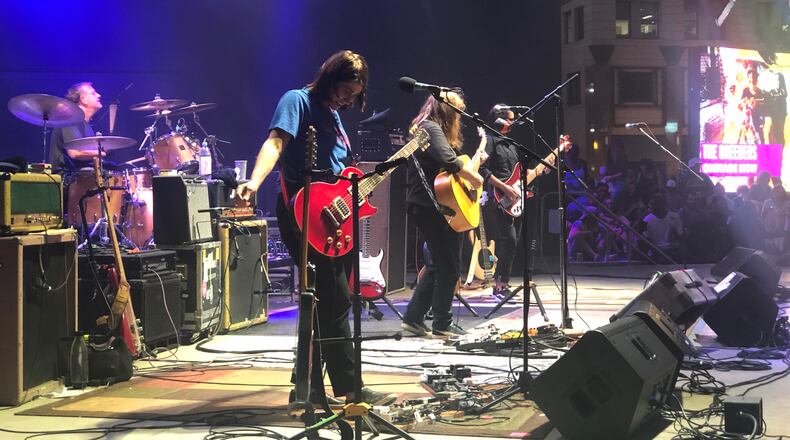“In Dayton, the arts community is such a vital piece of who we are as a community and our economy,” said Monica Jones, assistant to Dayton’s city manager. “They play such a big role in the vibrancy of downtown, and educational outreach to the community, and it seemed like a group that was being left behind by a lot of the stimulus funding.”
Credit: Jim Noelker
Credit: Jim Noelker
[#RedAlertRESTART: Why local event venues were lighting up red last night]
Scores of live events have been cancelled this year because of the coronavirus, including musicals, plays, symphonies, concerts, comedy acts, art shows, opera and dance performances.
Museums, galleries and arts centers temporarily closed their doors. Venues had to refund tickets to all types of shows, from small productions to Broadway hits like “Cats,” “Come From Away” and “Charlie and the Chocolate Factory.” A survey by Culture Works found that 10 local organizations alone had losses exceeding $6 million through the end of June.
Local groups have lost ticket sales and sponsorships and aren’t receiving revenue from traditional fundraisers and special events, said Matt Dunn, executive director of the Montgomery County Arts and Cultural District.
“They struggle to pay bills, to keep their doors open,” he said. “Many have laid employees off with no anticipated return date.”
[Community Conversations: Can Dayton’s arts community survive the pandemic?]
Even when venues reopen, Dunn said they likely will have to operate at reduced capacities, which means revenues might not cover costs.
Credit: CONTRIBUTED
Credit: CONTRIBUTED
The new city of Dayton Cultural Support Relief Fund will provide grants to performing and visual arts groups, libraries, museums and cultural institutions. Organizations may be eligible if they support painting, photography, writing, sculpture, theater, film, opera, dance, music, puppetry and other activities, city documents say. Information is available online at https://www.daytonohio.gov/bids.aspx.
Applications will be evaluated by third-party reviewers who may consider criteria such as job retention or creation, the importance of the organizations to the local arts and cultural community and general public, and how applicants plan to address specific cultural needs and provide services in Dayton. The deadline to apply is 10 a.m. Oct. 12.
The money can be used to cover COVID-19-related expenses between March 1 and Dec. 30, 2020, including payroll, mortgage and utility bills and other operating costs.
The city of Dayton was allocated more than $12 million in federal CARES Act funds over two rounds. Last week, state lawmakers took action that means Dayton likely will receive $5 million in additional CARES Act money.
Credit: Libby Ballengee
Credit: Libby Ballengee
The city has not decided how much CARES Act money it will spend supporting the local arts community, and it deliberately has not placed a cap on the amount it will award local groups, said Jones, assistant to the city manager.
“We are truly trying to be as helpful and as impactful for that community as we can be, and we don’t know what the need is," Jones said.
Ticket sales account for more than half of many arts organizations' annual revenues. That was considered a major business strength prior to the pandemic but makes them vulnerable when performances have been shelved, said Lisa Hanson, executive director of Culture Works.
Losing any of the local arts organizations would be devastating to those who depend on the arts for connection, healing, learning and entertainment, she said, but also it would hurt many other local businesses that rely on arts events for sales and foot traffic.
But, Hanson said, the city has responded to the needs of struggling arts organizations, and the relief program will offset overhead expenses and recoup income lost due to event cancellations.
Dayton Live plans to apply for the city’s relief funding. The organization owns and operates the Schuster Center, the Victoria Theatre and the Metropolitan Arts Center, including the Human Race Theater and PNC Arts Annex.
The organization lost about $2 million through the end of June because of the pandemic, and the losses continue to mount, said Ty Sutton, president and CEO of Dayton Live.
Before COVID-19, Dayton Live had about 260 people on its payroll and 200 to 300 contractors, Sutton said, but the staff now has been cut to about 26.
The venues have been closed since March 10, and this year Dayton Live has cancelled more than 500 shows, performances, private events and rehearsals.
The organization’s venues usually bring about 550,000 people downtown each year, with an estimated economic impact around $25 million.
The relief fund will be a big help during an extremely challenging period, especially considering performances are not likely to resume until the spring, Sutton said.
“This shows true leadership for the city of Dayton to step up with something specifically targeted to help out cultural organizations,” Sutton said.
About the Author




